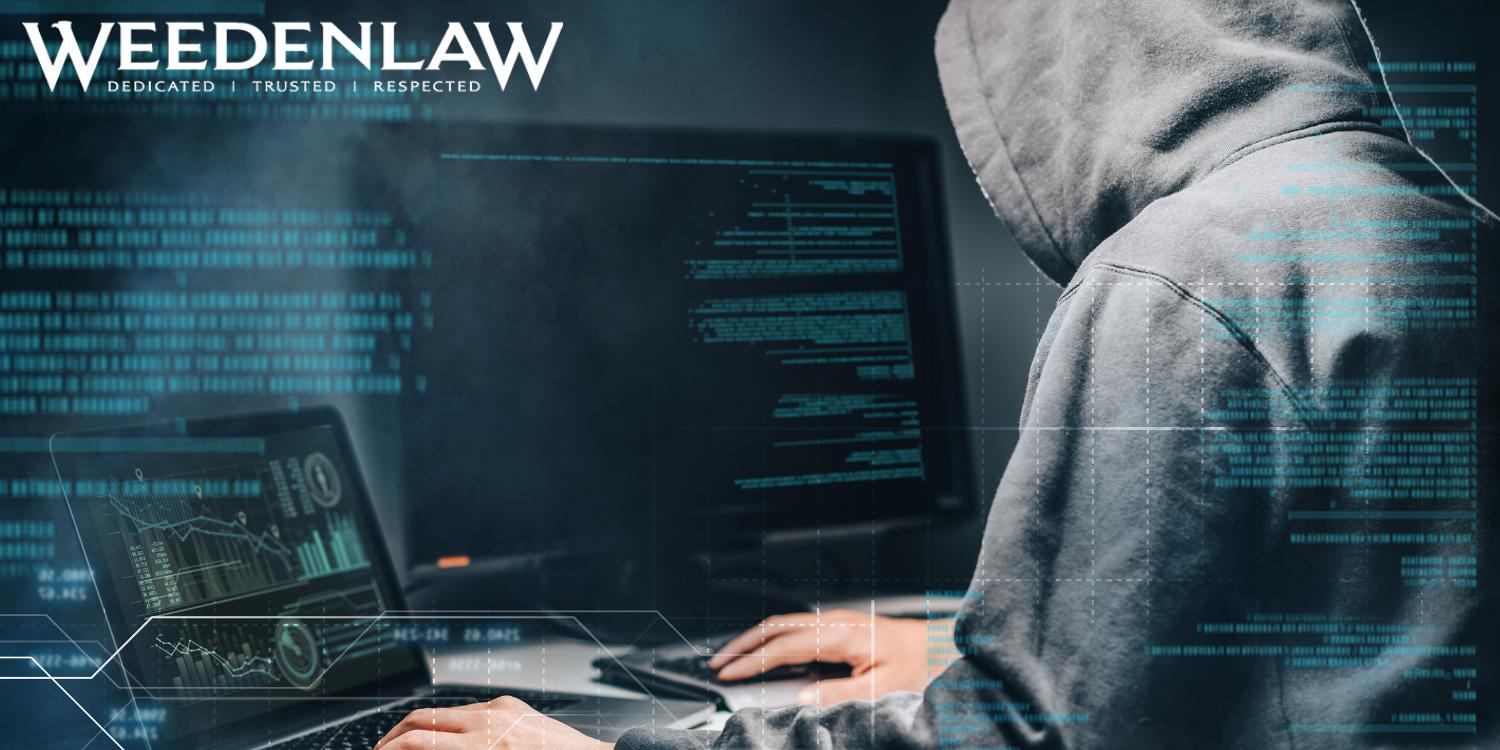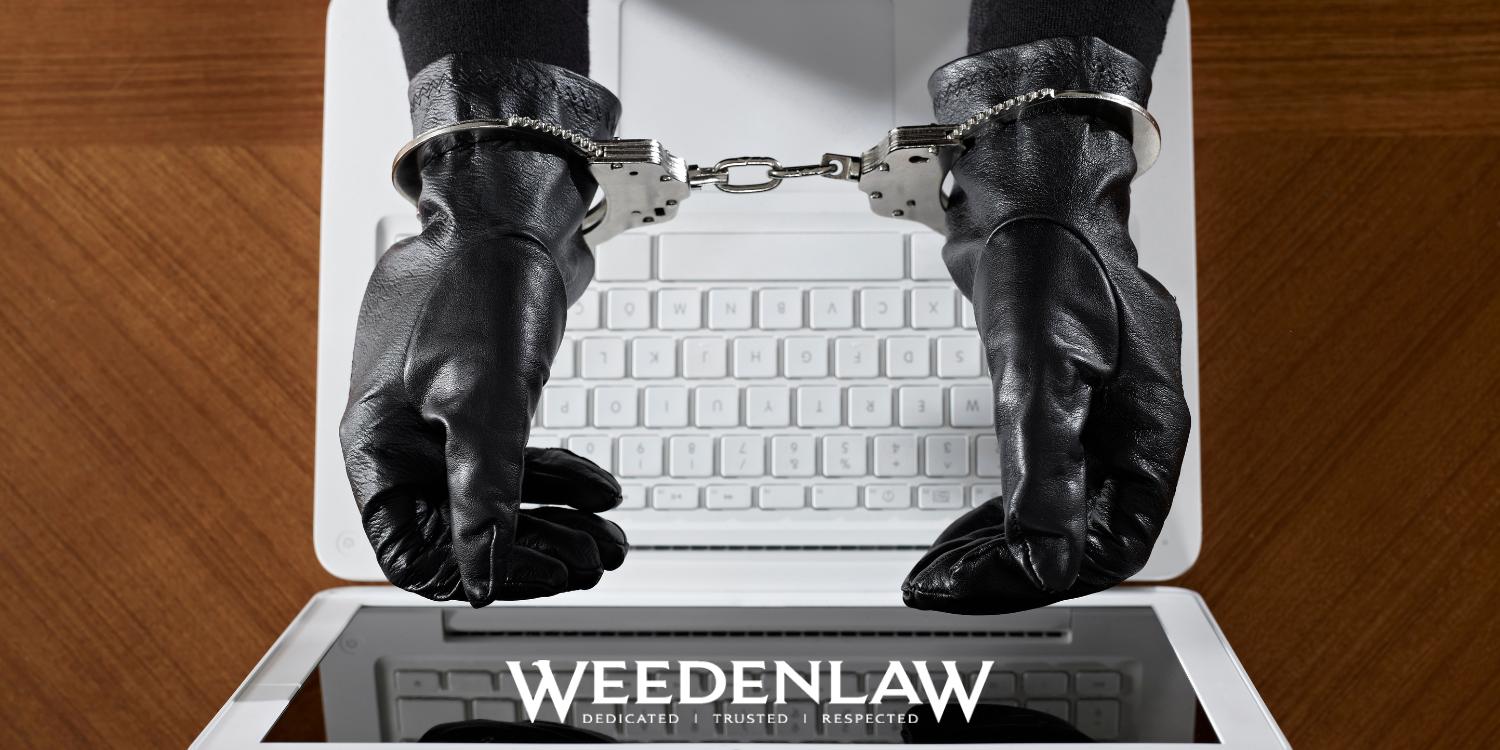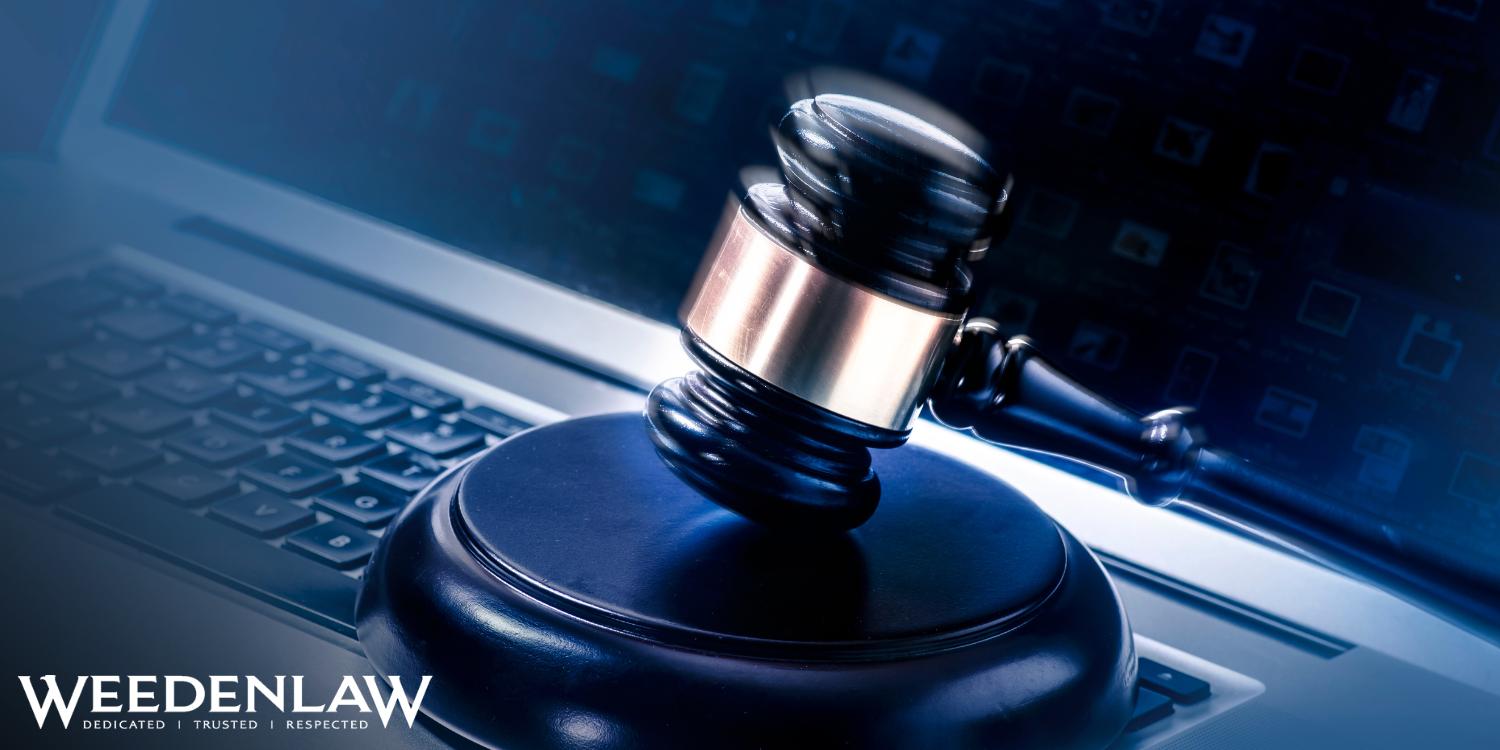Denver, Colorado Criminal Defense Attorney for Computer-Related Crimes
As technology advances, so do laws surrounding cyber crimes. When you’ve been arrested on a compter-related offense, the constantly changing laws can be confusing to understand. Don’t take your chances representing yourself against something as serious as an internet crime.
Following your arrest, it’s critical to begin your defense strategy by calling Denver computer crimes attorney Jeff Weeden. Not only will your legal team investigate the charges, but we’ll negotiate with the prosecution to get your charges reduced, dismissed, or dropped. If necessary, we’ll take the case to court and aggressively defend your rights and fight for your freedom.
If you’re facing computer crime charges in Colorado, contact WeedenLaw at (720) 307-4330 to schedule your free consultation today.

What is a Cyber Crime?
According to Colorado Revised Statutes 18-5.5-102, a cyber or internet crime is committed when a person unlawfully uses or accesses a computer or computer network. An individual can face criminal charges under this Colorado law if they:
- Access a computer to commit theft
- Access a computer, computer system, or network without authorization
- Access a computer to engage in fraudulent activity
- Alter, damage, or interrupt any computer, computer network, or computer system without authorization
- Use the transmission of a computer program, software, code, data, information, or command in order to cause damage
- Access a computer under false pretenses, false promises, misrepresentations, or fake passwords
- Use of a computer system or software application to disable or circumvent electronic queues that the owner intends to sell a limited number of tickets to an event by a single person via online ticket sales.
Under CRS 18-5.5-102, a cyber crime includes a computer, computer software, computer program, computer system, or computer network. As the digital age becomes increasingly mobile, people use tablets and mobile phones to gain access to the internet and social media. As such, internet crime charges can include a mobile phone or tablet for the above activities.

Common Types of Cyber Crimes
Cyber crimes encompass a broad range of illegal activity committed using computers and the internet. Listed below are some of the most common cyber crimes that people can commit using computers, the internet, or mobile devices:
- Computer hacking/ cyber espionage
- Online fraud, including identity theft, phishing scams, and false transactions
- Drug trafficking
- Sex crimes, including child pornography, prostitution, and solicitation
- Piracy of intellectual property, including movies, music, software, etc.
In addition to the five internet crimes listed above, there are many more cyber crimes that a person can be charged with at both the state and federal levels. Other common cyber crimes include:
- Possessing obscene materials
- Online scams
- Electronic harassment
- Blackmail
- Promoting or distributing obscene materials
- Gambling
- Using an online service without paying for it
- Sports betting
- Cyberstalking
- Conspiracy
- Purchasing illegal items
- Accessing a person’s email account or other private account without permission
- Failing to deliver an item someone purchased online
- Engaging or attempting to engage in sexual activity with a minor
While the cyber crimes listed below are extensive, there are many more crimes involving computers, mobile devices, and the internet that a person can face charges for. When you’ve been arrested for an internet crime, it’s critical to work with an experienced Denver attorney who’s handled cyber crime cases before. To learn more about your legal options regarding your internet crime charges, call a Denver computer crimes attorney at WeedenLaw today.

What are the Penalties for Computer Crimes?
Colorado Revised Statutes 18-5.5-102 outlines the penalties that a person facing internet crime charges can receive. Some cyber crimes will have harsher penalties than others, depending on the circumstances of the crime.
For example, theft of less than $300 is considered a petty offense that can result in a ten-day jail sentence and/or fines up to $300. Any computer crime a person commits involving theft will have harsher penalties depending on the amount of money or the value of the stolen property.
Other cyber crimes and their penalties are listed below:
- Accessing a computer without permission: This computer crime is considered a class two misdemeanor if it’s the person’s first offense. If it’s a second offense and the person has a prior computer crime on their record, they can be charged with a class six felony, which can result in 12 to 18 months in prison and fines up to $100,000.
- Internet luring of a child: Under Colorado law, this cyber crimes charge is classified as a class five felony and punishable by a maximum three-year prison sentence and fines of up to $100,000.
- Child pornography: If the child pornography is still images, the charge is a class five felony. If child pornography is motion, picture, video, broadcasts, or recordings, the charge is a class four felony, which is punishable by a six-year maximum prison sentence and fines up to $500,000.
The crimes and punishments listed above are just some of the charges you could face if found guilty of committing internet crimes. In addition to jail time and fines, a person can face other consequences from their charges. If an individual has a professional license, they risk losing it and facing disciplinary action by the licensing board. Another consequence is registering as a sex offender, depending on the sex-related cyber crime you’ve been charged with.

Can Cyber Crimes Be Punished as a Federal Offense?
In addition to facing charges at the state level, some cyber crime offenders can also be charged at the federal level. When cyber crimes involve internet use, they can be prosecuted as federal offenses. The Computer Fraud and Abuse Act (CFAA) is the federal law that outlines the criminal charges for damaging, stealing, or illegally accessing a computer system.
If the crime falls under the CFAA, it will be handled by federal prosecutors in federal court, with punishments served in federal prison. If convicted of a crime under the CFAA, a person can face up to ten years in prison and fines for their first offense. The prison sentence can increase to up to 20 years for any subsequent violations.
Why Cyber Crimes Are Unique
Cyber crimes are unique in criminal law because the laws are still under development and constantly changing as quickly as technology changes. Computers and the internet were unheard of when the country’s criminal laws were originally written. Now, our legal system has had to adapt to the changing times.
Another thing that makes cyber crimes unique is how in-depth the allegations and charges are investigated. Unlike other crimes, internet crime charges include extensive subpoenas, expert computer reports, search warrants for computers, and other legal issues not usually involved in other areas of criminal law.
Since cyber crimes continue to evolve, you need a criminal defense attorney with experience handling internet crime cases. Your Denver criminal defense attorney needs to understand both the law and technologies involved regarding your criminal charges.
What To Do If You’re Charged With a Computer Crime
If you’re facing cyber crime charges, contacting a Colorado criminal defense attorney as soon as possible is crucial to your case. Avoid talking to police without your attorney present because they will likely try to trick you into confessing to the crime or otherwise incriminating yourself.
Once you reach out to the experienced criminal defense attorneys at WeedenLaw, your legal team will handle the rest. When you work with a Denver attorney with experience handling internet crime cases, you’re chances of your charges being lowered, dropped, or dismissed greatly increase. As mentioned above, extensive investigations go into cyber crimes, as well as extensive punishments, and you don’t want to face these criminal charges alone.
Call Denver Criminal Attorney Jeff Weeden For Experienced Legal Representation ASAP
When you’re charged with a computer crime, contact an experienced criminal defense attorney at WeedenLaw as soon as possible. Our law firm has represented countless Denver residents in criminal cases involving burglary, drug crimes, violent crimes, sex crimes, and more.
To schedule a free consultation with attorney Jeff Weeden, call (720) 307-4330 or contact us online today.

































